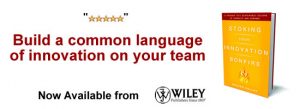Innovation ‘Soft’ Skills Matter

Virtual Reality. Artificial Intelligence. Block Chain technology. It’s no secret that the world around us is changing… fast! But ask most employers today and they’ll still probably tell you that people are their greatest assets.
In our rapidly changing world, it is more important than ever for the workforce to keep up with the job skills needed that will lead the organizations they work for down a path of growth.
From corporations to state governments, there has been no shortage of attention to the necessary 21st Century or innovation skills that people need to compete today and into the future. However; I believe that far too often this conversation is limited to just the technical or hard skills such as coding and computer programming. It is true these skills are increasing in importance and in the volume of roles where they are required, but not all jobs require mastery of these skills. I prefer to think about it like mathematics. It is certainly important to understand math to succeed in most work environments. However, only a limited number of roles and industries require mastery of more advanced skills such as calculus.
In fact, a growing number of industry leaders agree that simply an understanding, not a mastery, of technical skills will be necessary to compete in the 21st Century. It is mastery of soft innovation skills that will greatly increase the people asset in your organization.
“While the leaders of the future won’t necessarily need to be the ones writing code, experts suggest that they will at least be required to demonstrate a robust understanding of the capabilities, applications, and future potential of emerging technologies,†says freelance technology journalist Jared Lindzon.
In a column for Fast Company magazine, Lindzon goes on to suggest that skills needed to lead the company of the future include: the ability to think of new solutions, being comfortable with chaos, high emotional intelligence, and the ability to work with people and technology together. This is also supported by several job skills and research reports (hat tip Darin Eich).
A 2016 Job Skills Report by Bloomberg asked over 1,251 job recruiters at 547 companies about the skills they want in their professionals but can’t find. Four areas stood out as the skills “sweet spot.†These are the skills that are more desired but less common in job candidates: communication skills, strategic thinking, leadership skills, and creative problem-solving.
Also in 2016, the World Economic Forum published The Future of Jobs report. Findings are based on an extensive survey of Chief Human Resource Officers and other senior talent and strategy executives from 371 leading global employers. According to their report, the top four skills needed for 2020 include complex problem solving, critical thinking, creativity, and people management.
Finally, “Critical Skills Surveys†conducted by the American Management Association (AMA) in 2010 and 2012 identified four critical skills that 74.6% of managers surveyed believe will be important for their organizations into the future. The “Critical 4C Skills†as defined by the AMA include: critical thinking and problem solving, effective communication, collaboration and team building, and creativity and innovation.
Despite slight differences from report to report, necessary skills for the future can be grouped together as “innovation skills.†Successful innovation requires creative problem solving, leadership, strategic thinking and effective communication.
Technical skills are important, and we do need more students and employees developing an understanding and mastery in these areas. However, innovation at heart comes down to problem solving. It is the strategic, creative and people skills that will drive growth now and into the future.
At Centric, our mission is to increase recognition of the state of Indiana as a global center of innovation by equipping individuals and organizations with the critical thinking skills and cultural frameworks needed to drive innovation forward. We host monthly innovation workshops in Indianapolis and the annual Day of Innovation conference. This month we will expand our workshop programming through a partnership with Launch Terre Haute.
Centric’s programs are focused on teaching the soft innovation skills to Indiana’s workforce. Topics such as Design Thinking, customer experience mapping, Jobs to Be Done, visual thinking, and game play for ideation help increase the ability of our state’s workers to problem solve and think critically.
Bottom line: a state of problem solvers is a state that innovates.
This post was originally published in the Indianapolis Business Journal’s 2018 Innovation Issue.
Direct column link HERE.
Wait! Before you go…
Choose how you want the latest innovation content delivered to you:
- Daily — RSS Feed — Email — Twitter — Facebook — Linkedin Today
- Weekly — Email Newsletter — Free Magazine — Linkedin Group
 Jason Williams is the Executive Director at Centric, an Indianapolis-based nonprofit that connects, educates and celebrates innovation-minded thinkers in an effort to improve the success rate of innovation in Indiana. Connect with him on Twitter @jawbrain.
Jason Williams is the Executive Director at Centric, an Indianapolis-based nonprofit that connects, educates and celebrates innovation-minded thinkers in an effort to improve the success rate of innovation in Indiana. Connect with him on Twitter @jawbrain.
NEVER MISS ANOTHER NEWSLETTER!
LATEST BLOGS
Starbucks and Big Tobacco
Back in the 1950’s smoking was glamorous, and just about everybody who was anybody smoked cigarettes. Then came the discovery, to the shock of millions, that sucking smoke into your lungs might not be good for you. Then came another revelation that one of the substances in tobacco, nicotine, which was used as a poison by the Egyptians during the times of the Great Pyramids, is addictive. People then began a mass exodus from the consumption of nicotine via inhaled smoke.
Read MoreWal-Mart Goes Green – What about your company?
With the price of gas above $3.00, some companies (and hopefully all) are beginning to look at the fuel efficiency of their fleets. Wal-Mart is the most public example of this with its trucking fleet. Its efforts include:
Read More



